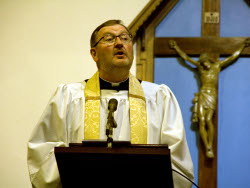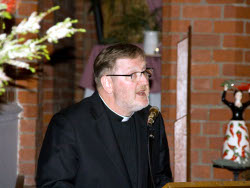|
Vicar's Musings for Ordinary Sunday 2125 August, 2013 Well, it's official, St Peter's Eastern Hill is on a mission. At the Feast of the Assumption we launched our two-year programme of Catholic Evangelism, which will culminate in the visit of Bishop Stephen Cottrell to the parish in 2015. Integral to our theology of mission is the idea of pilgrimage, we are on a faith journey, and we will encounter many other pilgrims on the way. In this spirit of openness and collegiality we invited neighbouring parishes to the launch, and some even came from neighbouring dioceses. It was humbling to see how many of our Anglo-Catholic friends resonated with this theme and made the effort to join us. More than 170 came to High Mass and 140 stayed on for the dinner and discussion. The Rev'd Canon Dr Scott Cowdell was our guest preacher and key-note speaker at the gathering, and he chose a somewhat provocative title for his opening paper: "An Evangelical Agenda for Catholic Anglicanism." Fr Scott opened with a sweeping summary of the diverse state of contemporary Anglo-Catholicism, highlighting the difficulty of moving forward together with any sense of unity: In all it's a complex and confusing story, containing real rivalries and hostilities. Perhaps the only way Catholic Anglicanism can make common cause amidst its many differences is by opposing Evangelicalism. After all, group cohesion, according to the wisdom of this world, is best achieved by cultivating a common enemy, or by lynching a suitable scapegoat. But that's not the mind of Christ, and we can't let the definition of Catholic Anglicanism simply be that it's not Evangelical. My own spiritual instincts are traditionally Catholic, rooted in Christ and his Gospel reshaping our sense of God in the Holy Spirit, who forms a community that shares in Christ's being, and in his continuing mission. That is to say, Trinity and ecclesiology are at the heart of the world, of humanity and of history. So the Church is the sacrament of Christ, and the Eucharist is our sharing in advance of God's dream for creation. Our mission emerges naturally from this Eucharistic logic, as we go in peace to love and serve the Lord.Certainly the High Mass that preceded our dinner and discussion on the Feast of the Assumption was a powerful symbol of unity. As we broke bread and shared wine together the real presence of our risen Lord was palpable. The mass, in itself, is an act of evangelism. Fr Scott expressed this so eruditely: What I'm suggesting to you is that Evangelical Catholicism is not Anglo-Catholicism to which we reluctantly add some ill-fitting Evangelical techniques for outreach. Rather, the Catholic vision is itself Evangelical, spilling over with the good news of Jesus Christ to transform the world in love, so that mission lies at the heart of Catholic Christianity rightly conceived. It's not Church plus evangelism and mission but Church as the fountain of evangelism and mission according to its inner logic, rather than these representing merely optional external practices. Worship is of course integral to Catholic Evangelism, but God does not call us to remain at the altar. It is mistaken to think that our mission as Catholic Anglicans is solely about "bums on pews" and building church congregations. If we are truly seeking to grow in God's love as a community, and to live deeply the integrity of the gospel, people will be drawn to our church - of course they will - but that should not be our focus. It is said that the worst way to achieve happiness is to try to be happy. If we give of ourselves, if we learn to recognise when we are falling into the trap of feeding greedy egos, if we choose instead to live as much as we can for others, that is where true happiness is to be found. It is in giving that we receive. Citing the former Bishop of Durham (1920-1939) Fr Scott noted: Bishop Hensley Henson reminded one of the great Anglo-Catholic congresses in their heyday that since they had obtained their tabernacles and their full Catholic privileges they must go out and find Christ in the faces of England's poor and neglected. Now that we have our rich traditions of Catholic worship, our aesthetics and our romance, we need to serve that vision by honouring the beauty and worth of a threatened creation and a humanity sold increasingly cheap. The Book of Acts gives a very clear vision of Catholic Evangelism: "Now the whole group of those who believed were of one heart and soul, and no one claimed private ownership of any possessions, but everything they owned was held in common. With great power the apostles gave their testimony to the resurrection of the Lord Jesus, and great grace was upon them all" (4:32-33). Church history bears witness to the fact that all the great movements of revival and renewal are founded on a renewed sense of Christian community. In closing, Fr Scott put out a challenge to rediscover this truth: I'd encourage us to rethink our approach to the young people with whom God blesses us. What if instead of a youth devoted to the escapism of multiple short-term dalliances and the ersatz relationships of social media we encouraged them to form Christian community and begin to discover Christ's mission, to live with other young Christians for a time of meeting Christ both on the mountain and on the plain? The jeunes ouvriers chrétiens of France, the so-called Jocists, set a pattern last century that many catholic worker groups and houses followed in English speaking countries, as centres for outreach and evangelism through Christian life together, teaching converts the mind of Christ through programs of seeing, judging and acting. What if we encouraged our young to consider vocation to the sacred ministry, rather than directing them towards more worldly and successful careers? Worship, outreach and community; Fr Scott's words are a timely gift as we pray and plan into God's future for St Peter's Eastern Hill. The Rev'd Dr Hugh Kempster |

Views is a publication of |
|
Authorized by the Vicar
(vicar@stpeters.org.au) |

